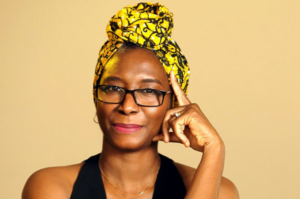
The Writer of the Month for April is Xola “Seeds and Sticks” Stemele!
Xola Stemele is an artist and writer from Gqeberha, South Africa. He is often associated with the alternate name, Seeds and Sticks, as he founded a brand under this name with the intention of reforming the identity of brands operating in South Africa’s townships. His company does this through aesthetics and storytelling, the latter of which Xola is well versed. In 2019, he authored a collection of short stories, Stories about the Other Side, and has had his poetry and stories published in a variety of magazines, such as Kalahari Review, Agbowo, Odd Magazine, and YoungAfrikan. His work is focused primarily on narratives that can lead us towards holistic development, as well as collective introspection.
With that introduction, I’m sure you are eager to read more about our April Writer of the Month so let’s get into it.
Brittle Paper
Xola, congratulations on being April Artist of the Month! I’ve had the privilege of working with you for a little while now but for our readers who are still new to Xola ‘Seeds and Sticks’ Stemele, tell us about your journey in becoming a writer.
Xola Stemele
Thank you so much! I don’t get too many of these so, it’s really humbling, to say the least.
I started writing in high school, poetry mostly until grade 10 when I got the thought of writing a book on ‘Evolution’. I got four pages in and then stopped from a lack of knowledge on the subject, but I could already feel that this – writing that is – is something I’m supposed to do. In regard to influence, Tupac I’d say was my biggest. In grade 8, for our English oral I had him as my role model to the surprise of my teacher, and contrary to my classmates who spoke about their mothers and fathers! Because growing up, I honestly didn’t know any other artist at the time that was popular for addressing injustices in this world, and being real cool and unapologetic while doing it – I didn’t know Fela Kuti. Another is my former lecturer at NMU, Nancy Morkel, who is by far the best at what she does.
Brittle Paper
That’s a very interesting journey to becoming a writer and a diverse mix of influences, which brings me to my next question. Is there a fellow writer you look up to for inspiration?
Xola Stemele
Honestly, I look up to every single author that tells a story that those doing the oppressing don’t want to hear. However, I do happen to have authors that I respect and admire more than others. It’s really hard to pick a few but I’d say Phaswane Mpe, Can Themba, Haruki Murakami, Charles Bukowski, and Unathi Slasha. More specifically though, Steve Biko, for writing exactly what he liked so that we, the future generation of writers, could too. And my brother Xolani Mahe, who published “Fever Dream” with Brittle Paper a while back.
Brittle Paper
I usually ask a final light-hearted question before the more serious things. The question always asks the writer to pick a category – books, movies, or series – and then list their top three but it is becoming the norm to go with “all of the above”. So, what will it be?
Xola Stemele
This is a real hard one, so, I think I’ll also have to choose one of each.
Favourite Book is Haruki Murakami’s After Dark
Favourite Movie is Quentin Tarantino’s Pulp Fiction
Favourite Series is Mr Robot.
Brittle Paper
Now, Xola, you were selected as Brittle Paper’s Writer of the Month because of your March piece, “The Case”. The piece is set in Apartheid South Africa and heavily influenced by South African history. What made you to take the specific route you did, that being the mining and union struggle of SAs history?
Xola Stemele
In spite of all the atrocities that were done during Apartheid, they were all legal; the national party used the law to its utmost ends to establish their own order in a country that, at the time, was foreign to them, at least in reference to the places and signs that were labelled ‘Europeans only’ as their identification in toilets, libraries, the post office, etc. The highest justification for it all was law, the killing, the forced removal, the exploitation of black labour, the detaining of people without trial; this was all in the acting as a hand of God to maintain peace in the country against terrorist threat, right? Not war, never that.
In consideration of this I got this question inside me of whether the past government was lawfully in a position to negotiate the future of this country, instead of a large trial where the people decided what should be done about those who’ve been found (with proof) of committing heinous acts? I saw this as more fitting, and, I thought using the character of a lawyer was perfect for being able to narrate directly into the mining exploits, the bad conditions, and the un-newness of situations such as Marikana where black life is devalued and deceased for the sake of profit.
I chose the mining route because it’s clear in its nature of exploitation. It doesn’t beat around the bush. It’s clear on why it’s here, to make as much money as possible, but at whose expense?
Brittle Paper
Much like Ernestina Aggrey’s “Castles without Royalty”, “The Case” is a fictional short story that is grounded in very real historical context. You managed to capture and balance both the experiences behind historical-and-contemporary, and national-and-personal. Do you often focus on socio-political topics in your work?
Xola Stemele
Yes, definitely. Socio-politics and economics make up a large part of the themes I choose to use in my work. I do this consciously, purposely; I do this because I’m aware that as a writer, I have the responsibility of spreading light on things purposely left in the dark. I focus on these topics because they play an immediate role in my life, the struggles and pains of my people, and those around me are, whether I like it or not, also mine. As a result, I choose these topics because I genuinely believe that they represent collective problems which cannot, I personally believe, be fixed with a singular solution such as a saviour, as religious texts often suggests.
At the end of the day, I think it’s easier to take out the leader of a movement, than it is to take out every single person who supports it.
Brittle Paper
Much like your socio-political views, you are well-rounded in writing as well. As a poet and fiction writer, how do you find writing dabbling between the two?
Xola Stemele
I’d say firstly, that I appreciate both forms as a means of expression, largely for the fact that they allow the writer to implore his or her message using a tone and style that can coincide with the beauty of art and storytelling in itself. But, within poetry I do feel for me that there’s a restraining factor different from writing fiction which is adhering to aesthetics, structures and norms that get in the way of communicating whatever you’ve got there, inside you. With fiction I feel it’s not as limiting when it comes to length or format so I’d choose it over poetry, and also because I generally just have a lot to say and fiction allows me to say it, a whole lot it without having to keep in mind if it sounds good to the reader’s ears or not.
Brittle Paper
You published a collection of short stories, Stories about the Other Side, in both print and digital. What are your thoughts on the move away from traditional publishing modes to more digital?
Xola Stemele
It’s actually been 3 years now, Tahzeeb, but it does somewhat feel like yesterday when I was in Cape Town trying to promote the book with absolutely no finances whatsoever. A really mind opening experience to me on the world of publishing, including how concentrated it is when it comes the kind of content that we can say expresses the present South African landscape.
As infuriating as inequality is in this country, most publishers don’t like writers putting things exactly as is, and would therefore prefer you add some violets here, and some red roses there, and maybe less anger everywhere. Well, my thoughts on digital publishing are that it has allowed room for more voices and conversations to exist. It’s allowed for more independence to the writer in regards to how their work is handled and, less of that concentration I was speaking of when it comes to marginalized topics in this country. Of course, there are negatives but, I believe the change has brought more good than bad.
Brittle Paper
Well put. Now, tell us about the anthology, Stories about the Other Side?
Xola Stemele
I started and completed Stories about the Other Side while studying for my BCom at the University of Fort Hare. The first story in the anthology strangely, “The Bus Ride”, I wrote 4 hours before my first major exam in 2015, all of it in one go on the back my operations management notes [laughs] I did happen to pass that exam by the skin of my teeth. Seriously though, the anthology is based on other side, being, the supernatural, witchcraft, religion, escapism, because as they say, no book is ever just about one thing but they all represent a singular narrative in the sense that they all speak from the other side of public opinion, they all speak from the position of someone whose story you might relate to, if they weren’t in a position that’s different to yours in society.
Brittle Paper
Apart from your writing, Xola, what is one thing about yourself that you want to share with our readers? Anything.
Xola Stemele
I’d say the fact that I see myself contributing to our film industry in the future. South Africa is rich with stories, literally rich. I have to tell some of them. I’ve also got a branding company, Seeds and Sticks, that works with entrepreneurs in the township to normalize local brand culture through aesthetics and storytelling. Yeah, and, I’m a sucker for love [laughs].
Brittle Paper
It’s been a pleasure to interview you and I look forward to our readers seeing more of your work on Friday.
For more of Xola’s work, be sure to check out Friday’s story, and for more interviews on our writers, check our last month’s with Ernestina Aggrey.








COMMENTS -
Reader Interactions